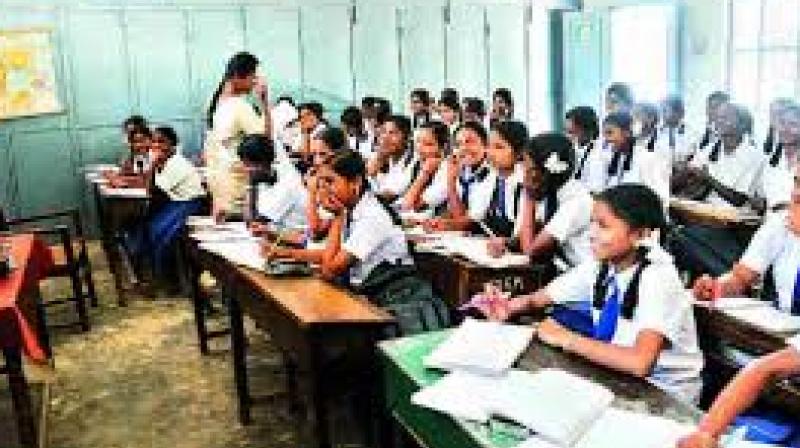Inter Board Sanskrit Circular Faces Telugu Wall
Intermediate lecturers associations and language experts asked that when the government had made Telugu compulsory till Class 10 for all boards, how could it promote Sanskrit at the Intermediate level.

Hyderabad: A circular by the Board of Intermediate Education (TGBIE) seeking proposals to introduce Sanskrit as a second language in government junior colleges has sparked a backlash from lecturer associations and student bodies, who said that it would cause immense harm to the propagation of Telugu in the state.
BIE officials said the circular was issued after they received a memo from the government in September 2024 to recruit Sanskrit lecturers and introduce the classical language as a subject in colleges, if students showed interest.
Intermediate lecturers associations and language experts asked that when the government had made Telugu compulsory till Class 10 for all boards, how could it promote Sanskrit at the Intermediate level.
“Fifty per cent students are studying languages other than Telugu, while 90 per cent of private colleges don't offer Telugu as an option,” said P. Madhusudan Reddy, president of Telangana Government Junior colleges lecturers Association. He said students, who did not study Sanskrit till Class 10, will choose it in Intermediate as they were allowed to write exams in any script and not essentially in Devanagari. This provision allows them to secure more marks.
The Telangana State Gazetted Junior Lecturers Association has sent an online representation to Chief Minister A. Revanth Reddy, requesting him to cancel the circular issued by the Regional Joint Director of the Board of Intermediate Education.
“Various states are promoting their language. Telugu will lose its presence if Sanskrit is introduced (in Intermediate). Out of 426 government colleges, 200 offer Hindi. If Sanskrit is also offered, Telugu will become less than 50 per cent of colleges,” said Madhusudan Reddy.
Dr Koppisetty Suresh, general secretary of Telangana State Gazetted Lecturers Association, said, “We are asking the Board to not drag Government Junior colleges into marks race driven by corporate colleges.”
“The previous BRS government had tried to introduce Sanskrit in junior colleges, but it was stopped after the teachers associations, Telugu literary, cultural and language associations protested against the move," he said.
The lecturer associations, and student leaders also raised concerns that widespread implementation of Sanskrit in government junior colleges could require a major overhaul in teaching resources, including the recruitment and training of qualified language instructors. They wondered if the government could appoint Sanskrit lecturers in 426 state-run colleges.
Clarifying on the issue, BIE regional joint director Jayaprada Bai said, “In September 2024, we received a memo from the government to fill Sanskrit lecturer posts. Accordingly, we released a circular asking district officials if students were interested in learning Sanskrit. Currently, only 15 colleges— five in Hyderabad and 10 in other districts — offer Sanskrit.”
TGBIE officials said that they had recruited Sanskrit junior lecturers and they will be accommodated as per the need. However, they agreed about the insufficient number of faculty to fill posts in the 426 colleges.
Officials said they did not receive any requirement proposal from college principals. “If they receive it, Sanskrit will be introduced from the coming academic year in the required colleges. In case of shortage, guest lecturers will be appointed, and requests will be sent to the government seeking the need for the appointment of Sanskrit lecturers,” they said.
Telugu faculty members said, “If Sanskirt is offered, the board must make it compulsory for students to write the exam in Devanagari script. If students choose Telugu, at least they will learn their mother tongue which is disappearing these days,” they added.
Students Federation of India (SFI) has also called on the Board of Intermediate Education to withdraw the circular and raised concerns that the introduction of Sanskrit might worsen learning gaps for students from marginalised backgrounds.
“Sanskrit was not taught in schools. So introducing it at Intermediate level will put students at a disadvantage. BIE is trying to introduce this just for the sake of marks, and it will not be useful for their future,” said T.Nagaraju, SFI state general secretary.

